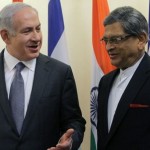In 1992, Israel broadly expanded its international relations, taking advantage of the fall of the Soviet Union’s Iron Curtain. Notwithstanding, improving ties with the eastern powerhouses of China and India was not a primary focus up until few years ago. Recently, Israeli leaders have made successive high profile visits to China, while engaging in considerable public diplomacy efforts vis-à-vis the Chinese people. Prime Minister Benjamin Netanyahu even greeted the Chinese people in their native Mandarin during their New Year’s Festival.
The growing cooperation with China is based on bilateral agreements in the fields of technology, green energy, agriculture, and water conservation. Enhancing relations with China in these fields is exactly how Minister of Trade and Labor Shalom Simchon planned for Israel to become one of the world’s top-15 economies. Simchon underlined that a Free Trade Agreement with China is currently on the agenda and is expected to be agreed upon in the foreseeable future.

However, these warming relations are constantly in jeopardy. Israel’s primary ally, the United States, fearing China’s increasing threat to its hegemonic position, acts to limit the Chinese influence in the Middle East. Previous Israeli attempts to bolster relations with China went up in smoke in 2000, when the Americans terminated a $250 million deal involving the sale of sophisticated military equipment, including the Phalcon early warning aircraft.
Despite China’s tempting economic opportunities, the Israelis are unlikely to toe the line with their American sponsors in the near future. Ties with India, on the other hand, have proven to be a far safer bet. While the United States thwarted the Phalcon deal with China, they approved a similar deal between Israel and India some years later. Like China, India boasts a rapidly emerging market, a vast population, and most importantly, a growing need for Israel’s conservation methods and technology. To sweeten the deal, the Stockholm International Peace Institute ranked India as one of the world’s largest arms-importers in its 2012 reports.
Yet unlike China, India is a democratic nation with similar national security concerns as Israel, mainly vis-à-vis Pakistan. Israel may try to capitalize on this interfacing point, as both nations are endangered by radical Islamists and seek resembling tactical resolutions. As the political clay in Pakistan produces security instability in the Hindu subcontinent, Israeli officials are deeply concerned by the growing Islamist trend that storms the Middle East, described as an “Islamist Winter.”
Indian-Israeli cooperation over security issues was previously seen after the terror attack in Mumbai on 2008, when Israeli security forces trained the elite Indian counter-terror unit, Force 1. In addition, Israel has become India’s second biggest arms supplier, recently overtaking Russia.
Nevertheless, not everything is coming up roses between the two countries: In March 2012, India did not approve an official visit of Israel’s Defense Minister, Ehud Barak, due to the threat of public discontent among the nation’s large Muslim minority. This incident combined with India’s moderate policy towards Iran serves as a remainder of the near term differences still to be resolved if the sides aim for rapprochement to materialize.
When the new geopolitical order of the 21th Century will materialize some 10-20 years from now, Israel has to be fully on America’s side, as the alliance with the US is Israel’s most precious asset. Thus, Israel ought to deeply consider any diplomatic maneuver it conducts nowadays in order to avoid snags with the US.
India is likely to play a main role in the international arena in the upcoming decades. Although its dependence on Iranian crude oil has put many hinders on the current sanctions campaign against the Islamic Republic, in the long term India is likely to change its policies due to the need to feed a rapidly growing population and balance China. Eventually, the well-acknowledged, sophisticated Israeli agricultural know-how and America’s ability to offset China will likely prompt the Indians to team with the West.
This article was written by Nimrod Assouline and was also published in Ynetnews on July 17, 2012.